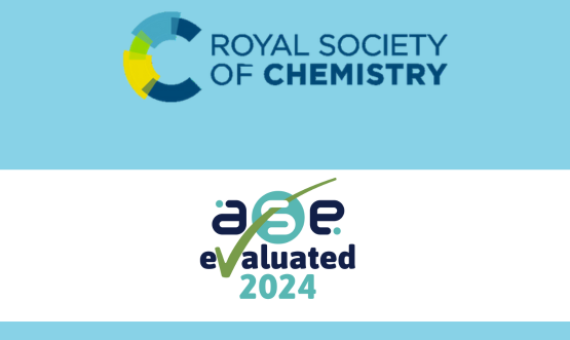ASE Evaluated for RSC's Sustained Professional Development courses for teachers of chemistry

ASE has awarded an 'ASE Evaluated' to the Royal Society of Chemistry's Sustained Professional Development courses for teachers of chemistry.
Link to the courses: https://edu.rsc.org/teacher-pd/live-online-courses/sustained-professional-development
Introduction
The Royal Society of Chemistry’s sustained professional development courses for teachers of chemistry is a suite of courses for teachers at different stages of their chemistry teaching careers. The courses include modules that cover early career teachers (ECTs); experienced teachers (including those teaching out of specialism); and those teaching curriculum topics for ages 13-16 and 16-19 years. These are fully-funded courses, so there is no charge to participants.
This is a comprehensive training resource, incorporating a range of different materials for use within and outside of the sessions. The different courses comprise:
- Chemistry for science teachers: Modules 1-3
- Early career teacher teaching strategies
- Experienced teacher teaching strategies
- Teaching strategies for key curriculum topics 13-16
- Teaching strategies for key curriculum topics 16-19.
The Royal Society of Chemistry’s sustained professional development courses for teachers of chemistry is a well-designed, easy-to-use and engaging resource. There is a consistent, standard format (each course is split into (4) session topics), which aids familiarity, so reducing cognitive load. Sessions are delivered online by subject experts and experienced teachers. Participants join the course as part of a cohort and develop a supportive relationship with both presenters and other participants. As the title suggests, the sessions within a module complement each other and take place over an extended period, allowing time between the sessions for participants to take what they are learning back to the laboratory.
The pre-course tasks provide opportunities for participants to trial their learning in their school context, thereby increasing the impact of the professional development on themselves and their pupils. The fact that there are courses for teachers at different stages of their career also allows sustained professional development over a longer period. The design of the materials is such that those who already have experience of teaching chemistry will benefit, for example by updating their knowledge, and from different approaches and suggestions from the experienced teacher presenters.
The modules are well designed to cover both subject knowledge (including, where applicable, practical content or disciplinary knowledge) and the pedagogy required to deliver this effectively. The use of resource sharing spaces and polls aids participant engagement and the learning environment is both safe and supportive. (This is particularly important for ECTs and those teaching out of specialism, who may be less confident initially.)
The design and delivery draw upon the EEF guidance for effective professional development and provide an easy-to-use platform for access to the courses. The resources and support materials are selected from the RSC’s extensive peer-reviewed database, many of which have been written by practising teachers.
The overall result is a consistent, high-quality offer and the retention rate of the participants across the course is testament to the quality and to the success in upskilling those teaching chemistry.
